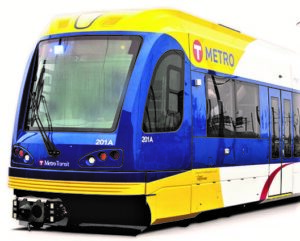BY JOHN CHARLES WILSON
The Twin Cities Transit Riders’ Union (TRU) has been recently advocating that Metro Transit quit charging fares and become a free service, like the public library. In this column, I would like to discuss the pros and cons of free transit.
First of all, free transit isn’t a new idea. It is currently in effect in Estonia and Luxembourg. As far as the United States goes, we do have free transit in limited situations, such as downtown or college circulators, or in rural areas or small towns like Missoula, Mont., where the cost of collecting and handling fares is almost not worth it. In the 1970s, free transit for everyone was experimented with during non-rush hours in Denver and in Trenton, N.J. Even the Twin Cities had two free transit experiments in the 1970s, one for senior citizens and one for children and teenagers. The one for seniors lasted several years and would probably have been made permanent except the MTC had a severe funding crisis in 1979. However, the one for young people didn’t last very long, for the same reasons as the Denver and Trenton programs were deemed failures: bad behavior on the buses skyrocketed out of control. Loud, boisterous teenagers ended up dominating the transit systems and making them unpleasant for everyone else. The Denver and Trenton programs, which included adults, had homeless people riding all day for shelter, often being a nuisance themselves.
Some people, who know of these failed experiments, claim that free transit can work in Europe but not in America because “Europe is different.” I really doubt that. There is more than enough stupidity in Europe too. While I don’t know much about the Luxembourg program, the one in Estonia may well be a workable model in the United States, should any transit agency here decide to go fare-free.
The Estonian model doesn’t officially abolish fares, but instead makes free passes available to all legal residents of the transit district. These passes are on an electronic smart card similar to our Go-To Card. Tourists and people without a pass still have to pay. Here’s where the catch is: If you misbehave on transit, your pass can be confiscated. Since there are cameras on buses and trains, even if you “get away,” if the situation is serious enough, the authorities can go through the tape and the record of exactly when each card was tagged to connect the proper card to the culprit and deactivate it. I would suppose if a person claims to be innocent, they can request a hearing and try to get their pass reinstated. Of course, with video evidence, that should be a rare situation. Getting to ride free, but only if you behave, would be a good incentive for people to behave, or at least I hope so.
Unfortunately, in most big cities, bad behavior on transit is a common problem even with fares being charged (actually, sometimes because of disputes over the fare). However, sometimes the wrong people are blamed. For example, homeless people are vilified for sleeping on buses and trains even when they don’t do anything wrong; they are considered a nuisance just for being there. This has led some transit systems to institute rules against “joyriding” and “loitering,” both in transit centers and on vehicles. The La Crosse Municipal Transit Utility’s monthly passes are explicitly good for unlimited ONE-WAY rides. Their fare chart actually has it in all caps. At first I didn’t realize what they meant: you can’t use a pass to ride a full round trip on one bus. You must get off at the end of the line and wait till the next bus to go back, or pay cash. Fargo’s Metropolitan Area Transit doesn’t allow a full round trip on one bus, even if you paid cash. Saint Cloud Metro Bus and Rochester Public Transit ban “loitering” on buses, which makes no sense to me: If you paid your fare, you should have the right to ride the bus and not be considered “loitering.” This irks me as a transit hobbyist: One of my pastimes is going for recreational bus rides. Usually, these kinds of rules don’t affect me, as I normally get off at the end of the line and take the next one back anyway in order to not look like a weird-o. However, there are some bus trips where that’s really not feasible—for example, if there’s only one return trip and it’s the same bus you went out on, or if the route is a loop. But the idea that it’s anyone’s business whether or not I have a “destination” is highly offensive to me, as it should be to anyone who cares about freedom.
























